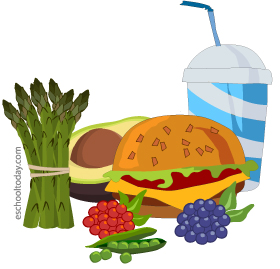- Nutrients in food
Introduction to food nutrients
Many young people love ice cream. It is a kind of food. So, what about eating a container of ice cream in the morning, another container for lunch, and another for dinner — and eating that for a whole month? Surely, that is just trouble coming! Food is more than things we eat, far more than just what we love to eat.
No one can survive without food. Food is a key characteristic of all living organisms. For many people, food is also something they enjoy eating, for the taste of it. That does not mean a person can eat only one food type all the time. For example, many people enjoy eating fruits, but fruits alone will do a person no good. If food is eaten to fuel the body, and with the right variety and amounts, the body will benefit immensely from food.
Humans, just like other heterotrophic animals, eat both plants and animals (meat) as food. Food ensures our survival, and more so if the food contains the right balance of nutrients.
- Food eaten is used by the body as fuel (energy), just like the way automobiles need gas (fuel) to run.
- Food as fuel is used to provide warmth within the body for the cells to function.
- Food helps build new cells and body tissue, as well as help repair, worn-out cells, tissue, and organs.
- Food helps the body fight off harmful pathogens and diseases.
Some ingredients in food help the body unlock minerals in other food.

Food can be in solid form or liquid form. An example is milk, coconut water, or orange juice.
In this lesson, we shall be looking at the nutrients in our foods we eat. The term for this science is nutrition. Nutrition is the science of food, together with its makeup, and how the components of food meet the body’s dietary needs.
Nutrients are those elements from food and drink that perform a sustaining or metabolic function when taken inside our bodies. (1)
Good nutrition is key because it is the foundation of good health. It ensures the body’s immunity, physical and mental development, and increased productivity. In the next few pages, we shall see what the ingredients of a balanced diet (complete food) are, what they do to the body, and which foods contain them. These are carbohydrates, vitamins, proteins, fats, minerals, and water.
- Water: The Nutrient, Linda S. Boeckner, Extension Nutrition Specialist
Food and Nutrition, 1989, Revised January 2009
